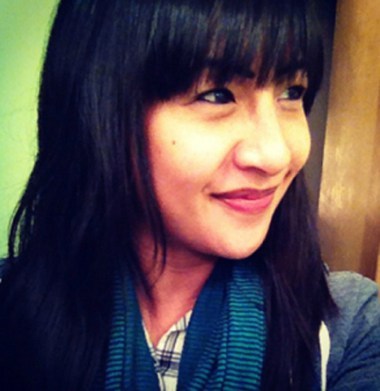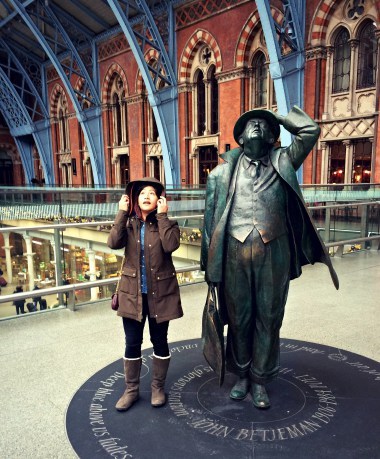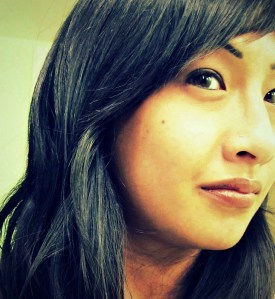My editor speaks

[Cheri Lucas Rowlands’s tiny house in California. Photo: Cheri Lucas Rowlands]
Cheri Lucas Rowlands on life & writing in the real & digital worlds.

[Cheri Lucas Rowlands: story wrangler]
In a slightly earlier era, Cheri Lucas Rowlands might have written for newspapers or magazines. She’s got a similar but more fluid job, one not nearly so place-bound. She works remotely: when she’s not at home in Sonoma County, California, she travels the world, writing, editing, and taking photographs for herself and for the internet publishers who employ her.Rowlands is a “story wrangler” and editor for San Francisco-based Automattic, the parent company of WordPress.com and Longreads.com (among other products). WordPress is the world’s most popular web and blogging software, and currently powers over 60 million sites on the internet. This very website runs on WordPress software, though when I launched it—eight years ago this month—I started on the hosted version, WordPress.com.
I met Rowlands when we were classmates in Goucher College’s MFA program in creative nonfiction, 2005-2007; in fact, she may have been one of the twenty-somethings I asked back then about which blogging platform to use and was told “go with WordPress without a doubt,” which turned out to be solid gold advice. Knowing Rowlands gave me confidence recently to pitch her my essay “Why I Hate My Dog,” which she liked and passed along to the editor-in-chief of Longreads, who gave it the green light and returned it to Rowlands for editing.
As I explained in my last post, after working with me on my essay, she agreed to answer some questions about editing writers, online publishing, blogging, Longreads, Automattic, and her career in the digital world of writing and publishing.
Q. Longreads is such an interesting mix of nonfiction. There are famous writers, newsy stories, and now, apparently, quirky essays like mine from left field. What are the goals of your burgeoning site? Why should writers pitch Longreads instead of, or as well as, a site like Slate?
I admired Longreads from afar, before it joined Automattic in 2014. I liked discovering writing that was recommended by fellow readers, and loved that all of this happened on Twitter—that I could broaden my reading experience simply by following a hashtag (#longreads). So when Longreads joined Automattic, I was thrilled. Longreads has grown to publish exclusive and original reader-funded storytelling, from both established and emerging writers. It’s great to see how it has published a mix of in-depth journalism and high-impact stories in a short time.
Mark Armstrong, who founded Longreads in 2009, has shared his insights on the whys behind Longreads. In his post about being a better editor, he wrote about the advantages that we can offer our writers: establishing deep, lasting relationships with writers; helping them to produce the highest-quality work; and promoting stories to a strong, loyal following of publishers and readers. On Longreads’ seventh birthday this past April, he also talked about our continued dedication to produce original longform stories.
Personally, I’m eager to work on stories that introduce me to new ideas and topics; I knew nothing about Jorge Luis Borges before I worked on “Borges and $,” for example, and it was a bit intimidating at first, but ultimately a wonderful way to stretch myself—and get to know Borges and his work. Building both an editor-to-writer and writer-to-writer relationship is also important to me. I continue to grow as a writer, and I’m interested in working on stories that push me as a writer as much as an editor.

[Cheri Lucas Rowlands works remotely and took this while traveling in Lisbon.]
Q. How do you see your role as an editor?
I’ve worked in editorial in some form for 20 years—as a high school reporter, newspaper book reviewer, magazine fact checker, marketing proofreader, freelance travel and education writer . . . But it’s only since being an editor at a blogging company that I’ve felt truly comfortable as an editor. Over the past four years, I’ve become more adaptable.
Automattic is the first tech company I’ve worked for. It’s been a learning experience working in an environment in which the majority of people are not writers, but developers, data scientists, and others with more technical backgrounds. Externally, I’m also engaging with bloggers every day from around the world, all with different needs, interests, voices, and computer skill levels. I continue to adapt on both fronts, doing a variety of tasks and working with all kinds of content —copy inside an app, in your blog’s dashboard, on a technical support page, across official social media profiles, but also publishing author interviews, company announcements, and now longform pieces for Longreads. My job title—story wrangler—reflects most of my day-to-day work quite well: I herd words and stories.
Working on and editing for Longreads is different. It’s less about multi-tasking and dipping in here and there, and more about slowing down and going deeper into a project. I’m reminded of our MFA years at Goucher College: reading, writing, and thinking about writing all the time and losing myself in others’ worlds.

[Rowlands’s laptop in blogging mode.]
Q. You’re also a popular blogger! How is your blogging evolving? What about the blogging genre itself?
Like you, I started my site eight years ago, and I’ve experienced growing pains since, and especially after evolving into somewhat of a public face for the WP.com platform. I’m not sure how many times I’ve retreated into myself, turning away from the readership I’ve amassed on my blog, afraid to publish something that’s not perfect or unhappy because I now write less for myself and conflate writing with publishing.
I like to try other platforms, like posting on Medium, creating photo essays on Exposure, or experimenting on now-defunct spaces like Hi and Maptia. Nothing else ever sticks. Other services feel like rented space, and I always come back to WordPress.com, which I consider my online home. But I certainly get restless—periodically changing cherilucasrowlands.com from a blog to a static website and back to a blog, switching themes several times a year—which is a natural response, I think, like renovating a physical home. I’m reminded of Frank Chimero’s piece on digital homesteading: “I want a unified place for myself—the internet version of a quiet, cluttered cottage in the country.”
I’ll read the “blogging is dead!” proclamations from time to time, but I generally tune out the noise. Whatever you want to call it: blogging, online journaling, writing in real time for an audience—that fundamental human urge to express yourself won’t go away.
Q. What’s the relationship of your blogging and your other writing?

[Rowlands in London train station: Paris-bound.]
I recently excavated bits of my graduate manuscript and put it out there (my blog’s “1997” category), which was very much a personal thing, as I needed to close that door. During my time at Goucher, some of us may have had blogs, and I’m sure I could have found classmates on MySpace or whatever I was using those days. But I was too focused on writing. I can’t imagine doing an MFA today and blogging and (social) sharing my way through it. I’d be too distracted!Dani Shapiro once wrote a lovely New Yorker piece on memoir in the age of social media: “I worry that we’re confusing the small, sorry details—the ones that we post and read every day—for the work of memoir itself.” If I was blogging while writing my manuscript, it would have been a different experience.
But I revisited and published parts of my memoir on my blog because I was also trying to get excited about writing again. Being on a blogging platform all day, every day, has made it more challenging to write just to write. Posts, instead, have become social media updates: declarations, documented highs or lows of my life. So I’m happy I’m now editing longform pieces at Longreads—diving into that shared space with another writer, rediscovering the process of writing. Ultimately, I like this balance in my work: the ability to face outward into a glowing screen and connect with bloggers from all walks of life, but also the opportunity to retreat inward, in that more intimate space I’ve neglected since my MFA.
Both modes are important. And even though blogging consistently and confidently isn’t easy, I value being able to publish to an immediate audience, and to contribute to conversations happening now.
Q. Your career seems uber cool, and I wonder what life and educational experiences have led you to it?
All of my internships, jobs, and travel experiences have led me to my position at Automattic. I’ve always enjoyed writing, even when I was a little girl, so I sensed I’d hone that skill no matter what I did, and whether or not a job directly involved writing. That was the case when I was a teaching assistant in a sixth grade language arts classroom—I wasn’t writing, but I was reading and grading papers, talking to kids about their essays, and chatting about literature in small groups. And when I was a proofreader at a women’s college, proofing ads, admission brochures, and course catalogs, I wasn’t really writing then either, but I was working with words, and continuing to build a very broad skillset.
I caught the travel bug early, especially after a visit to Paris when I was thirteen, and traveling frequently has prepared me for writing and editing on the web, arguably as much as my editorial jobs. You have to be pretty nimble and aware of what’s going on in the world, especially while working for a global platform like WordPress.com, on which you’re potentially reaching millions of readers. I’ve learned to be more open, flexible, and empathetic from my time studying, living, and working abroad. These experiences have been invaluable and have helped me shape a perspective that makes my work better.

[In Macau, an autonomous territory beside China. Photo: Cheri Lucas Rowlands]
Q. It’s hard for me to picture what must be a fast-evolving, fluid work environment in the online realm. Are you able to travel and work remotely?
Yes, I can I work from anywhere I can connect to the internet! Automattic is a distributed company, so its nearly 500 employees can work from any location they choose. We work from home, in coworking spaces, from RVs or tiny houses (that was me for the past year!), or are completely nomadic. We have a physical office in San Francisco, but the majority of the company is scattered across 45 countries.
It’s such an interesting setup that works, and I now can’t imagine working any other way. The bulk of our interactions are text-based: we communicate and interact on Slack and on internal team and project blogs called p2s, where conversations are transparent and searchable. We have occasional video hangouts. We rarely use email. There are spaces for high-level discussions, project updates, and watercooler-like chats about everything from our company culture, the tech industry, our passions, and our lives. And so, much of my world unfolds on this very screen, where I type these words.
Before Automattic, I juggled part-time jobs with freelance work for a newspaper and several websites, so I’m used to bouncing around and working from home. I’m also pretty introverted and self-directed, so this setup works well for me. But I know working remotely isn’t for everyone.
Q. Besides Longreads and blogs on WordPress, what are you reading these days that excites you, online or off?
I can’t say I’m loyal to any publication nor have any favorites. But broadly, I enjoy reading about home and identity (I’m reminded of this piece from Guernica), and writing about living with technology that isn’t too academic (I occasionally come upon essays in The New Inquiry, and have read a few pieces in the fairly new Real Life mag, but otherwise, I welcome recommendations for more literary nonfiction about life in our tech and social media age). While I don’t do any long distance running anymore, I’m interested in fitness, running, and ultrarunning stories, and writing about outdoor adventures and national parks (I tend to enjoy the features at Outside).
 Interestingly, I’ve become fascinated with, umm, poop. For the past year, my husband and I have been using a simple bucket toilet and composting our waste, which has been a surprisingly great, eye-opening experience. As a society, we use so much clean water to flush away our waste. I suppose my (tiny) living situation over the past year has opened my eyes to a lot of things, so I also like to read about minimalism, people’s relationship to space and stuff, and alternative energy.
Interestingly, I’ve become fascinated with, umm, poop. For the past year, my husband and I have been using a simple bucket toilet and composting our waste, which has been a surprisingly great, eye-opening experience. As a society, we use so much clean water to flush away our waste. I suppose my (tiny) living situation over the past year has opened my eyes to a lot of things, so I also like to read about minimalism, people’s relationship to space and stuff, and alternative energy.
[My last post told the story behind my essay Rowlands edited, “Why I Hate My Dog.”]
![[Belle at the beach, January 2014.]](https://i.gr-assets.com/images/S/compressed.photo.goodreads.com/hostedimages/1468489506i/19711752._SX540_.jpg)
[Belle in Florida, a photo Rowlands chose for “Why I Hate My Dog” on Longreads.]
The post My editor speaks appeared first on Richard Gilbert.



